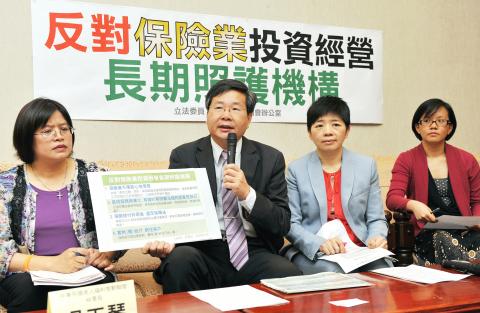Lawmakers and civic groups yesterday voiced their opposition to a government plan to allow insurance companies to run nursing homes, saying that it may commercialize the long-term care sector.
“Care of elderly people is not a commodity and should not be commercialized,” Taiwan Solidarity Union Legislator (TSU) Lin Shih-chia (林世嘉) told a press conference at the legislature in Taipei yesterday.
In a meeting of the Executive Yuan’s Promotion of Private Participation in Public Infrastructure Projects Commission last week, the proposed relaxing of regulations in the Senior Citizens Welfare Act (老人福利法) to allow for-profit enterprises to run long-term care (LTC) facilities received the support of the Executive Yuan.

Photo: Chien Jung-fong, Taipei Times
In addition to leading to unequal distribution of resources, privatizing services may result in exploitation of nursing staff since it is natural for private businesses to maximize profits, she said.
Lin was reacting to a proposal by the Financial Supervisory Commission (FSC) to allow insurance firms access to the LTC industry.
“Although the Ministry of Finance and the Department of Health both support the proposal, I am concerned that if insurance firms are allowed to operate in this sector, they would unfairly compete with government and non-governmental organizations,” TSU Legislator Hsu Chung-hsin (許忠信) said.
Hsu said that if insurance firms are granted access to the sector, new kinds of LTC insurance products would be on offer that are not “cashed in,” but are paid in the form of home or community-services benefits.
“However, the current Insurance Act (保險法) clearly states that the insured amount must be specified in an insurance contract,” Hsu said. “Allowing non-cash benefits without proper supporting measures and government supervision would affect the rights of the insured.”
Awakening Foundation policy director Tan Yu-jung (覃玉蓉) highlighted the dangers of allowing large private companies — as well as foreign firms — into the market.
“If we don’t have a healthy government-backed long-term care system in place, who is going to take over if large corporations decide to withdraw?” Tan asked.
“The government also plans to bring in foreign capital for care of the elderly, which includes Chinese capital — are we going to look to China for such care?” she asked.
Foundation for the Welfare of the Elderly secretary-general Wu Yu-chin (吳玉琴) also voiced concern over the proposals.
“The FSC cited Japan as an example of allowing private companies into the care sector. However, before implementing such a move, the Japanese government built a strong government-backed public insurance system,” Wu said.
“Also, the role of businesses in the Japanese care industry is limited to at-home care,” Wu added.
Wu said the groups have vowed to block any revisions to the Senior Citizens Welfare Act, which requires LTC service providers to be non-profit organizations.

Taiwanese can file complaints with the Tourism Administration to report travel agencies if their activities caused termination of a person’s citizenship, Mainland Affairs Council Minister Chiu Chui-cheng (邱垂正) said yesterday, after a podcaster highlighted a case in which a person’s citizenship was canceled for receiving a single-use Chinese passport to enter Russia. The council is aware of incidents in which people who signed up through Chinese travel agencies for tours of Russia were told they could obtain Russian visas and fast-track border clearance, Chiu told reporters on the sidelines of an event in Taipei. However, the travel agencies actually applied

Japanese footwear brand Onitsuka Tiger today issued a public apology and said it has suspended an employee amid allegations that the staff member discriminated against a Vietnamese customer at its Taipei 101 store. Posting on the social media platform Threads yesterday, a user said that an employee at the store said that “those shoes are very expensive” when her friend, who is a migrant worker from Vietnam, asked for assistance. The employee then ignored her until she asked again, to which she replied: "We don't have a size 37." The post had amassed nearly 26,000 likes and 916 comments as of this

New measures aimed at making Taiwan more attractive to foreign professionals came into effect this month, the National Development Council said yesterday. Among the changes, international students at Taiwanese universities would be able to work in Taiwan without a work permit in the two years after they graduate, explainer materials provided by the council said. In addition, foreign nationals who graduated from one of the world’s top 200 universities within the past five years can also apply for a two-year open work permit. Previously, those graduates would have needed to apply for a work permit using point-based criteria or have a Taiwanese company

The Shilin District Prosecutors’ Office yesterday indicted two Taiwanese and issued a wanted notice for Pete Liu (劉作虎), founder of Shenzhen-based smartphone manufacturer OnePlus Technology Co (萬普拉斯科技), for allegedly contravening the Act Governing Relations Between the People of the Taiwan Area and the Mainland Area (臺灣地區與大陸地區人民關係條例) by poaching 70 engineers in Taiwan. Liu allegedly traveled to Taiwan at the end of 2014 and met with a Taiwanese man surnamed Lin (林) to discuss establishing a mobile software research and development (R&D) team in Taiwan, prosecutors said. Without approval from the government, Lin, following Liu’s instructions, recruited more than 70 software